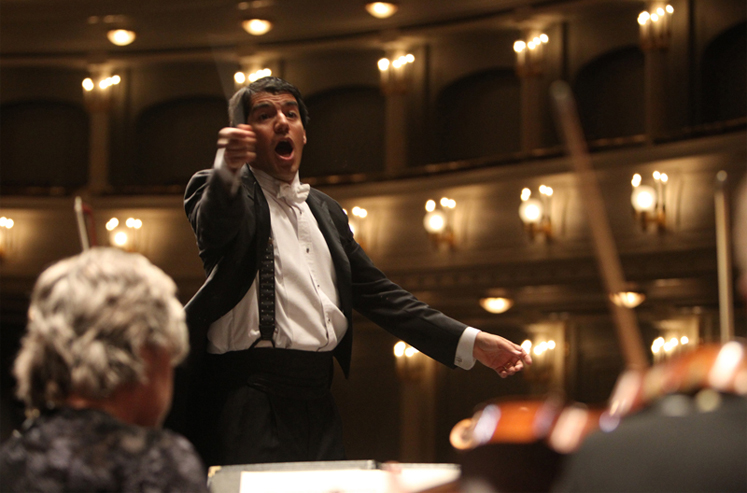The word “seduction” best describes what went on at Bass Performance Hall Saturday night, as the Fort Worth Symphony and music director Miguel Harth-Bedoya lured a diverse audience into listening to—and, it seems, enjoying—serious music by leading composers of our time.
The concert, titled “Caminos del Inka,” featured music from the four countries (Peru, Ecuador, Chile, and Argentina) encompassed by the pre-Columbian road system. The seduction began with a harmless and handsome symphonic arrangement of the Peruvian melody made famous by Simon and Garfunkel as “If I Could,” accompanied by colorful images of Peru.
From there, Harth-Bedoya pulled the intrigued audience forward toward ever more serious musical expression, beginning with Harth-Bedoya’s own arrangement for chamber orchestra of music from the eighteenth-century vice-regal court of Lima. The ever-so-slightly more serious pathway continued with contemporary Ecuadoran composer’s Diego Luzuriaga’s colorful Responsorio, with the real substance of the program arriving in the form of California-born Peruvian-American Gabriela Frank’s rhapsodic Illaca for flute and orchestra (with soloist Jessica Warren-Acosta). Argentine Osvaldo Goijov’s Mariel for cello and orchestra (with soloist Jesús Castro-Baldi of the TCU faculty as soloist) likewise provided a glimpse of the profound expressiveness of another of the major composers of our time.
From these two major works, the program returned to less intense (and possibly less demanding, for some listeners) fare, including late romantic Chilean composer Enrique Soro’s Danza fantástica and Peruvian composer Jimmy Lopéz’s Fiesta! In spite of a bit of gimmickry, and more visual interference than this cranky old critic would prefer, the obvious goal of broadening the function and audience of the symphony while maintaining artistic integrity was achieved, and achieved in an admirable fashion.
Olga Kern Inaugurates Kimbell Music Series
Last week also brought, for area audiences, two artists who are definitely unsurpassed and possibly unequalled at what they do best. 2001 Cliburn gold medalist Olga Kern returned to Fort Worth as the inaugural artist on the Cliburn Foundation’s concert series at the Kimbell Art Museum’s new Renzo Piano Pavilion on Thursday and Friday nights. At the Friday night concert I attended, Kern first regaled audiences with beautifully paced, technically perfect renditions of Schumann’s Carnaval and Chopin’s Second Sonata. But it was in her performance, after intermission, of an extended set of Etudes and Preludes of Rachmaninoff that she revealed herself as a supreme interpreter of that composer. It is difficult to imagine that there is a more perfect, more intelligent, more devoted, and more capable advocate of Rachmaninoff’s piano music alive today. (The new hall, incidentally, proved an almost ideal room for piano music, with a clear but warm acoustic.)
Is Matthias Goerne the best living interpreter of Mahler’s songs?
Meanwhile, German baritone Matthias Goerne presented songs from Mahler’s Des Knaben Wunderhorn with the Dallas Symphony and music director Jaap van Zweden in four consecutive concerts, beginning with the Thursday night performance I attended at Meyerson Symphony Center. Goerne brought a hypnotically beautiful natural tone and fine dramatic style to the late romantic tragedy embodied in these songs. As with Kern and Rachmaninoff, it’s difficult to imagine any artist alive today singing Mahler more meaningfully than Goerne in this performance. Conductor Van Zweden rounded out the program with appropriately muscular and tragic renditions of the Sea Interludes from Britten’s Peter Grimes before the Mahler and Brahms’ Fourth Symphony afterward.
Image: Fort Worth Symphony Music Director Miguel Harth-Bedoya (Credit: Richard Rodriguez)






